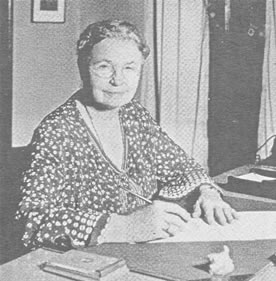
Miss Cooke had as one of her first grade students the son of John Dewey. She made outstanding contributions as a teacher, an executive, and a writer. Flora Cooke was best known for her progressive philosophies used in building a school in the Middle West which became nationally known. Together with Perry Dunlap and Carleton Washburne she was instrumental in founding Winnetka Teacher's College.
Students who later focused on highlighting earlier moments in her career concluded that Flora J. Cooke was a woman who made a life out of standing up for what she believed in. They titled their presentation acknowledging her contributions as The Aura of Flora.
Deceased 2/21/1953. (From Ms. Weld's notes, the Internet, and Francis Parker student notes)
Further research conducted at the Chicago Historical Society allows the reader to have deeper insights into the life and accomplishments of Miss Cooke, born Flora Juliette Hannum, Bainbridge, Ohio, December 25, 1864. adopted at age sixteen by Charles and Luella Miller Cooke August 29, 1880. Flora was one of six children, all of whom were taken by relatives. Her Mother died when she was five years old, her Father when she was thirteen. Flora was deemed too active to be taken in and she had six homes in one year before her adoption.
She is credited as being the founder of Chicago Woman's Club and is listed in Great Living Americans XIV, "Flora J. Cooke: Grand Old Lady of Education," written by Carol Lynn Gilmer in Coronet, October, 1947. She was a founder and trustee of Roosevelt College in Chicago.
Miss Cooke graduated from high school in Youngstown, Ohio, in the 1880s and attended a college for girls. She was not popular, but was determined to have college experience. Her family situation demanded immediate self-support. Her first teaching position was in a small country school in Auburn, Ohio (1884), followed by a position in Youngstown, Ohio (1885), and in 1889 she taught under Colonel Francis W. Parker at the Chicago Normal School. The Chicago Institute was founded in 1899 and Miss Cooke was asked to go there with Colonel Parker. In 1901 she was appointed principal of the new school (Francis W. Parker School) on Webster Avenue, and remained there until her retirement in 1934. Colonel Parker had greatly influenced Miss Cooke's teaching and a brief explanation of his philosophy may be found at the end of this document.*
*Colonel Francis
J. Parker served as Superintendent of Schools in Quincy, Massachusetts.
Together with other educators, he was instrumental in beginning
a new movement in elementary education. He was set against old forms
in which Boston schools were a self satisfied exponent, against
routine, and treated texts with slight reverence. The alphabet,
spelling book and primer reader were the foundations of old style
instruction.
Parker, using methods known as Quincy Movement, came to Chicago
Normal Schools where Mrs. Emmons Blaine endowed a new private school
that became the Chicago Institute of Academics and Pedagogic. Mrs.
Blaine believed that these new methods were the right ones but there
was strong opposition by other educators. Parker himself was known
from Cape Town to Greenland and in all European schools of consequence
at the time.
In 1868 Parker was named principal in Dayton, Ohio, where, despite
opposition by parents the Board of Education approved of him and
supported him as principal, naming him Assistant Superintendent
in 1871. Textbook publishers became his next source of opposition,
but by that time the Quincy schools were convinced that education
by the old system was not effective, and hired Parker as superintendent
with a free hand to revise the system.
Flora Cooke was one of the teachers who followed Parker into his
new position from Chicago Normal Schools and was greatly influenced
by him. In a talk to the English Club of Greater Chicago, October
16, 1937, she stated, "The greatest thing I learned from Colonel
Parker was the impossibility of ever again losing faith in any child."
Parker had once said, "There never was a bad child. There are
bad homes, bad habits, twists due to poor heredity and environment,
but every child needs to be understood and have a chance to think
and act for self, to have security which affection gives, and to
have a friend.